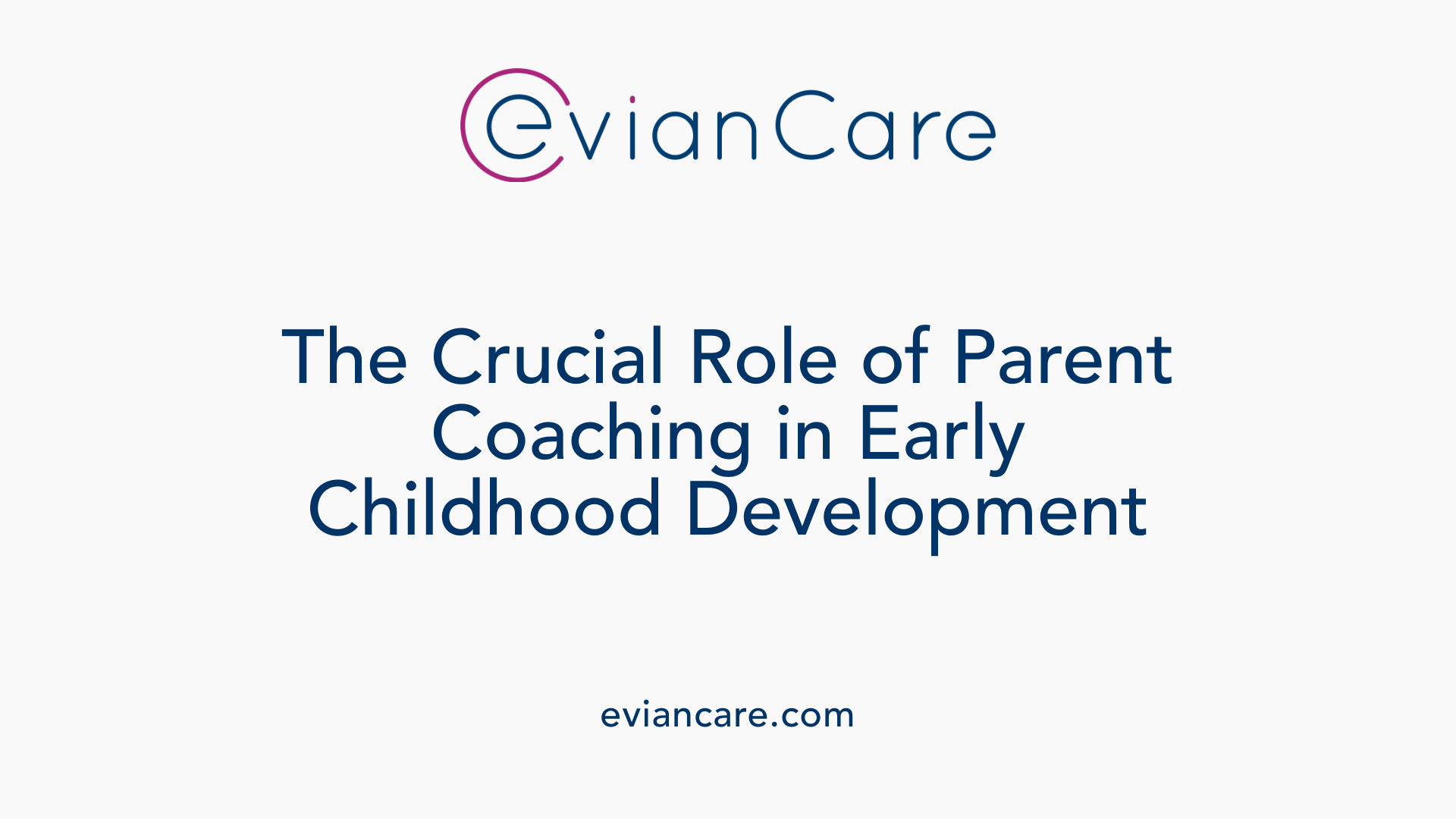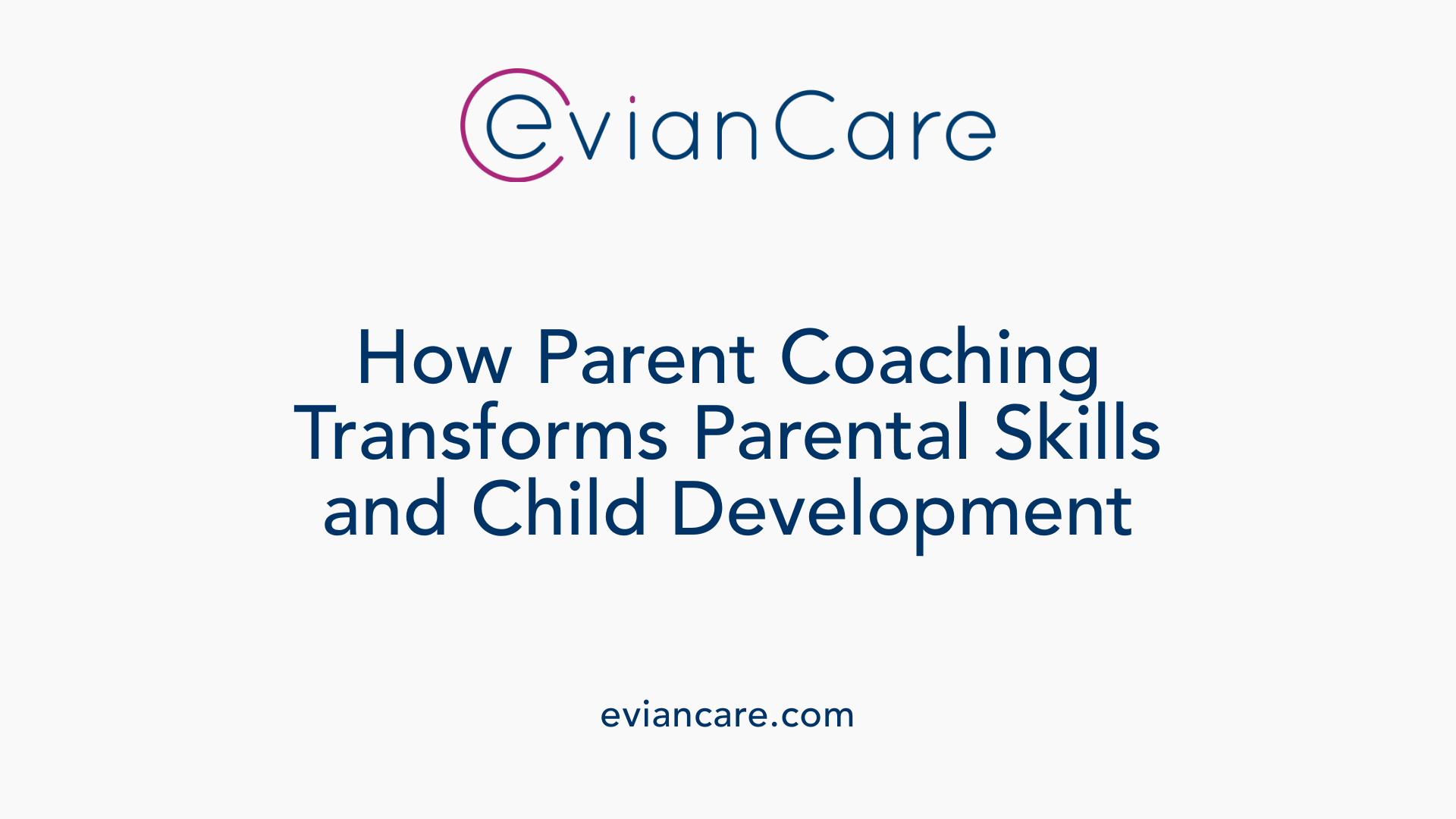
Introduction to Parent Coaching in Developmental Disabilities
Parent coaching plays a pivotal role in early intervention programs for children with developmental disabilities (DD). By equipping parents with tailored strategies and fostering confidence, parent coaching enhances developmental outcomes and supports family well-being. This article explores the multifaceted nature of parent coaching, its significance in developmental programs, evidence of its effectiveness, and practical implementation methods.
Understanding the Role of a Parenting Coach
What is the role of a parenting coach?
A parenting coach is a trained professional dedicated to supporting parents through guidance and practical strategies to improve their parenting skills. These coaches focus on strengthening the parent-child relationship by helping parents develop effective communication and positive behavior management techniques. They act as partners in the parenting journey, offering objective feedback and accountability.
A parenting coach’s responsibilities include assisting families in navigating daily routines, handling behavioral challenges such as meltdowns or power struggles, and improving responses to children’s emotional needs. They also provide tailored plans for co-parenting, especially during transitions like separation or new sibling introductions, and address complex family dynamics such as blended families or issues related to cultural practices.
Support in communication, behavior, and daily routines is central to their role. Coaches demonstrate and model strategies during parent-child interactions, helping parents incorporate these into everyday life. This approach ensures interventions are practical and sustainable. Coaches also prioritize creating a safe space where parents feel comfortable practicing new skills, asking questions, and reflecting on their parenting.
Handling transitions and managing complex family situations are also critical areas. For instance, during a move or family change, a coach can help parents develop strategies to minimize stress and promote stability for children. They work to empower parents, build their confidence, and reduce parental stress, ultimately fostering a more positive and supportive environment for children’s growth.
Overall, the role of a parenting coach combines emotional support and skill development, making a meaningful difference in family dynamics and children’s well-being. Their goal is to help parents feel equipped, confident, and empowered to nurture their children's development effectively.
Importance of Parent Coaching in Developmental Programs
 Parent coaching, particularly through models like Occupational Performance Coaching (OPC), plays a vital role in early childhood development for children with developmental disabilities. One of the main advantages is the provision of personalized support, where clinicians work closely with parents to develop tailored strategies suited to their child's unique needs. This individualized approach ensures that techniques are practical and relevant, making it easier for families to integrate them into daily routines.
Parent coaching, particularly through models like Occupational Performance Coaching (OPC), plays a vital role in early childhood development for children with developmental disabilities. One of the main advantages is the provision of personalized support, where clinicians work closely with parents to develop tailored strategies suited to their child's unique needs. This individualized approach ensures that techniques are practical and relevant, making it easier for families to integrate them into daily routines.
Research, including pilot randomized controlled trials, has shown that parent coaching not only improves children's community participation—such as engaging in social outings and community activities—but also sustains these positive effects over time. This suggests that coaching helps parents implement effective strategies consistently, fostering ongoing progress.
Furthermore, parent coaching enhances parental confidence and satisfaction. When parents learn to facilitate their child's development actively, they often feel more competent and empowered. This boost in confidence positively influences family dynamics by reducing stress and promoting healthier interactions. As they become more involved and responsive, the parent-child relationship strengthens, creating a nurturing environment conducive to social and emotional growth.
Strategies such as the Family Guided Routines Based Intervention (FGRBI) emphasize embedding learning within everyday activities. This approach shifts the parental role from passive observer to active leader. When parents are trained to use intervention techniques during natural routines—like mealtimes, play, or bedtime—they can address developmental goals pragmatically and effectively.
In addition, technology-enhanced coaching—such as telehealth platforms—has expanded access and convenience, ensuring more families benefit from expert guidance regardless of location. The collaborative and interactive nature of coaching increases competence and confidence among parents, which is fundamental for fostering independence and positive behavioral outcomes in children.
In summary, parent coaching supports tailored, practical strategies that improve community participation, boost parental confidence, and nurture healthier parent-child relationships, all of which are critical elements in early childhood intervention for children with developmental disabilities.
Evidence Supporting the Effectiveness of Parent Coaching

What evidence exists regarding parent coaching's effectiveness in DDD programs?
Research consistently supports the positive impact of parent coaching, particularly in programs addressing developmental disabilities and community participation. A notable study—a pilot randomized controlled trial—found that Occupational Performance Coaching (OPC) significantly helped parents achieve their own goals related to their children’s community involvement. These improvements were not temporary; effects persisted during follow-up assessments, demonstrating lasting benefits.
Further evidence suggests that parent coaching enhances parents’ satisfaction and confidence, fostering a more active role in their children’s development. Comparative studies indicate both parent coaching and consultation are effective, but coaching shows a trend toward greater improvements in community participation outcomes.
Beyond community engagement, research highlights that coaching interventions favorably influence children’s occupational performance, communication, language skills, and behavior. Systematic reviews and pilot randomized controlled trials (RCTs) reinforce these findings, confirming that coaching promotes social inclusion and increases family self-efficacy.
Overall, the scientific community agrees that evidence-based coaching strategies—those focusing on joint planning, feedback, and reflection—are essential tools for supporting families and children with developmental disabilities. These strategies have been validated through multiple high-quality studies, establishing parent coaching as a vital component in early childhood development programs.
Implementation Strategies and Practical Methods

What strategies and methods are used in parent coaching?
Effective parent coaching relies on a variety of collaborative strategies designed to empower families and promote meaningful participation in their child's development. Central to these strategies are joint planning, observation, reflection, and feedback.
During joint planning, practitioners and parents work together to set achievable goals tailored to the child's needs and family routines. Observation allows coaches to see how parents interact with their children in natural settings, providing valuable insights for informed guidance.
Reflection encourages parents to think about their interactions, identify what works well, and consider areas for improvement. Feedback from practitioners, whether immediate or scheduled, helps parents refine their strategies and build confidence.
These techniques are individualized, respecting each family's unique circumstances. Coaches adapt their approaches to fit routines, daily activities, and cultural contexts, making interventions relevant and sustainable.
Technology plays a supportive role, especially through tele-intervention platforms, online resources, and digital tools. These tools increase access, provide continuous support, and enable real-time coaching.
A prominent example is Family Guided Routines Based Intervention (FGRBI), which embeds functional child outcomes into everyday activities like mealtime, play, or dressing. This method emphasizes parent-led interaction and turns routine moments into opportunities for development.
Fostering strong bonds is another benefit of these approaches, as coaching during natural routines enhances connection between child and caregiver. It also shifts the parental role from passive observer to active leader in intervention.
In summary, practical parent coaching combines collaborative planning, structured observation, reflective practice, and feedback, all integrated into families' daily lives. This approach ensures strategies are practical, personalized, and highly effective in supporting early childhood development.
Integration of Parent Coaching into Various Program Models
How is parent coaching integrated into different DDD program models?
Parent coaching plays an essential role across several developmental intervention models. It is a foundational element in Naturalistic Developmental Behavioral Interventions (NDBI), Family Guided Routines Based Intervention (FGRBI), and community-based early intervention services.
In NDBI, coaches work closely with parents during everyday routines, equipping them with strategies to support their child's cognitive, social, and communication skills. This model encourages parents to take a leading role, transforming their involvement from passive observers to active leaders in their child's development.
FGRBI emphasizes embedding functional skills within familiar routines. Coaches guide parents in using daily activities as opportunities for skill development, reinforcing learning in natural contexts. This approach makes intervention practical and highly applicable to each family's environment.
Community-based services, such as those provided by organizations like BARC Developmental Services, further incorporate coaching principles by focusing on personalized, flexible strategies that respect family circumstances. These programs often utilize tele-intervention platforms and online resources to enhance accessibility and consistency.
Training practitioners in the fidelity of coaching practices is vital for success. It ensures that coaching strategies are delivered reliably, maintaining the quality and effectiveness of interventions. Strategies include workshops, webinars, fidelity assessment tools, and ongoing professional development.
Overall, integrating parent coaching into various models promotes family engagement, enhances intervention relevance, and leads to more meaningful developmental outcomes. These strategies acknowledge families as vital partners, empowering them to support their child's growth effectively.
Impact of Parent Coaching on Parental and Child Outcomes

What is the influence of parent coaching on parental skills and child development?
Parent coaching, especially through models like Occupational Performance Coaching (OPC), has demonstrated notable benefits for both parents and children. It significantly enhances parents' skills, confidence, and engagement by actively involving them in their child's development process. Through joint planning, observation, feedback, and reflection, parents become more adept at applying intervention strategies within daily routines.
This increased parental competence translates into more consistent and effective support for their children. Children benefit from improved communication, language, and behavioral outcomes. They tend to display fewer challenging behaviors, stronger social skills, and better occupational performance overall.
Research shows that coaching fosters deeper parent-child relationships, creating a nurturing environment that promotes learning. By empowering parents to lead and participate actively, coaching supports children’s developmental milestones across various domains, including social, cognitive, and behavioral skills. Evidence suggests that when parents are equipped with the right strategies and confidence, children experience more meaningful progress and greater participation in community activities.
In summary, parent coaching acts as a catalyst for positive change, enhancing parental abilities and delivering measurable improvements in child development outcomes.
Outcomes and Long-term Benefits of Parent Coaching

What are the outcomes of parent coaching on developmental progress and family well-being?
Parent coaching, especially through models like Occupational Performance Coaching (OPC), has demonstrated significant positive effects on children with developmental disabilities (DD). These coaching strategies help improve occupational performance and foster developmental progress across multiple domains, including cognitive, social, communication, and behavioral skills. By actively involving parents in the intervention process, coaching enhances their ability to support their child's growth effectively.
In addition to developmental gains in children, parent coaching positively impacts the family's overall well-being. It reduces parental stress by empowering caregivers with practical skills and confidence, making them feel more capable in managing daily routines and challenges. This increased confidence often promotes a more cohesive and positive family environment.
Research from systematic reviews and pilot randomized controlled trials highlights that the benefits of parent coaching extend beyond immediate outcomes. Children tend to sustain developmental improvements over time, and families develop greater resilience, which enables ongoing engagement with interventions and routines. These long-term benefits include heightened parental competence and resilience, paving the way for continued support and participation in community activities.
A well-structured parent coaching program, whether delivered face-to-face or via telehealth, fosters lasting changes by promoting active participation and reflection. This approach helps embed intervention techniques into daily routines, ensuring that developmental gains are maintained and continuously built upon. Overall, parent coaching is a valuable element of early childhood development programs, offering enduring advantages for both children and their families.
Closing Thoughts on Parent Coaching’s Role in DDD
Parent coaching is a critical element in developmental disability programs, offering personalized strategies, fostering parent confidence, and supporting meaningful developmental outcomes for children. Its evidence-based framework ensures that interventions are practical, sustainable, and tailored to individual family needs. As research continues to validate its effectiveness, integrating parent coaching into early childhood programs remains essential for empowering families and enhancing the lives of children with developmental disabilities. Building on this foundation through ongoing professional development and innovative approaches will ensure that parent coaching remains a cornerstone of comprehensive developmental interventions.
References
- Parent coaching to enhance community participation in young ...
- How the Coaching Model Supports Families With Infants and ...
- Empowering parents through parent training and coaching.
- Coaching Parents of Children With Developmental Disabilities to ...
- Parent coaching to enhance community participation in young ...
- Coaching in Early Intervention
- Parent empowerment and coaching in early intervention
- Parent Coaching — North Star SLPC, Inc.












